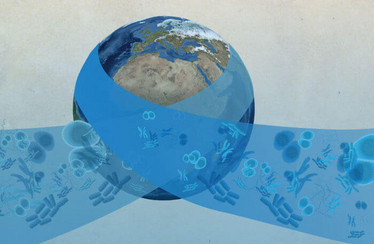
A Microbial Map to Cancer
Machine learning meta-analysis reveals cancer signatures in the gut microbiome
We enjoy a symbiotic relationship with the trillions of microbes that inhabit our bodies. We provide them with a home and food; they assist in digestion, metabolism, and infection protection. But what if they have even more to offer? Recent research reveals that detectable changes in our gut microbiota may give us the opportunity to detect early-stage cancer.
Researchers from the European Molecular Biology Laboratory (EMBL) and the University of Trento used machine learning to perform a meta-analysis of eight metagenomic studies of colorectal cancer (1). Their goal? To identify microbial signatures distinct to cancer. “We validated these signatures in early cancer stages and in multiple studies, so they can serve as the basis for future noninvasive cancer screening,” explained EMBL’s Georg Zeller in a press release (2). Co-author Nicola Segata added, “We not only established a panel of gut microbes associated with colorectal cancer across populations, but also found signatures in microbial metabolism that have similar predictive power.”
These signatures not only offer the potential to spot cancer using microbial signatures, they may also allow scientists to understand how gut microbes can contribute causally to the development of disease. Ultimately, Zeller says, the work may even lead to a better understanding of how we can modulate the microbiome to prevent cancer. “But that’s very difficult!”

- J Wirbel et al., “Meta-analysis of fecal metagenomes reveals global microbial signatures that are specific for colorectal cancer”, Nat Med, 25, 679 (2019). PMID: 30936547.
- EMBL, “Global microbial signatures for colorectal cancer established” (2019). Available at: bit.ly/2HIjg1X. Accessed May 30, 2019.

While obtaining degrees in biology from the University of Alberta and biochemistry from Penn State College of Medicine, I worked as a freelance science and medical writer. I was able to hone my skills in research, presentation and scientific writing by assembling grants and journal articles, speaking at international conferences, and consulting on topics ranging from medical education to comic book science. As much as I’ve enjoyed designing new bacteria and plausible superheroes, though, I’m more pleased than ever to be at Texere, using my writing and editing skills to create great content for a professional audience.















